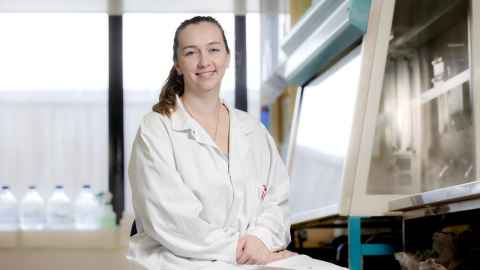Helen Murray: staying ahead of the game
8 November 2023
Brain researcher Dr Helen Murray's work investigates the risks of high-impact sport to players’ brain health.

Helen, who is based in the Centre for Brain Research (CBR), is one of the country’s leading experts on chronic traumatic encephalopathy (CTE), a form of dementia associated with repetitive head injury. Although CTE can be categorically diagnosed only after death, neurologists can give a ‘probable’ CTE diagnosis while people are alive, using an informed process of elimination.
The disease has received greater public attention in recent years as former professional sportspeople with probable CTE, such as ex-All Black Carl Hayman, have spoken out about the toll their sports careers have taken on their health.
Helen hopes her research will one day help athletes detect changes in their brain health much earlier in their careers, helping to prevent long-term damage.
She has played for the Ice Fernz ice hockey team since 2013, captaining the side from 2016 to 2022 and also represented New Zealand in inline hockey. Helen has seen many teammates suffer concussions and has also experienced her own share of knocks to the head, including a mild concussion this year.
But CTE is not only caused by concussion. Even seemingly minor collisions can cause a violent movement of the brain, creating microscopic damage to brain tissue that accumulates over time.

Helen’s research involves examining the brains of past contact-sport athletes that have been donated to the Neurological Foundation Human Brain Bank at the CBR. She uses a novel method of tissue labelling that she developed during a postdoctoral fellowship at the National Institutes of Health in Washington, DC.
Using fluorescent tags, she can label up to 100 proteins on the same slice of tissue, providing 20 times more information than traditional methods. The goal is to find biomarkers – biological molecules that indicate damage has occurred in the brain. One day these biomarkers could be measured with a blood test to help identify if an athlete has accumulated too much damage to their brain.
“It means we could identify when people are having brain changes before their symptoms start,” Helen says.
“That’s really important because that’s the window where we might be able to intervene.”
I’ve always had the mindset that my brain is precious and
have wanted to protect it.
Helen says she has always been aware of the risks involved with repetitive head injuries in contact sport and never takes her brain for granted.
“I’ve always had the mindset that my brain is precious and have wanted to protect it – so I play in a way in which I try to limit collisions.”
However one thing that’s changed as a result of her research is that she ensures she gives herself time to recover properly after taking any knocks to the head and won’t “push myself to go back too quickly”.
“It has made me more cautious about that, but it hasn’t made me want to stop playing.”
Helen hopes further research into CTE will allow athletes to make informed decisions about how they play and take time to recover from head injuries.
“If you have the knowledge that your brain isn’t coping, then you have the power to change it.”
SUPPORT BRAIN RESEARCH
Find out how you can support Dr Helen Murray’s ground-breaking research on Chronic Traumatic Encephalopathy. See giving.auckland.ac.nz/CTE
This story appears in the Spring 2023 edition of Ingenio.